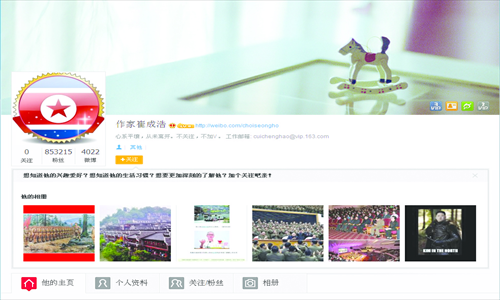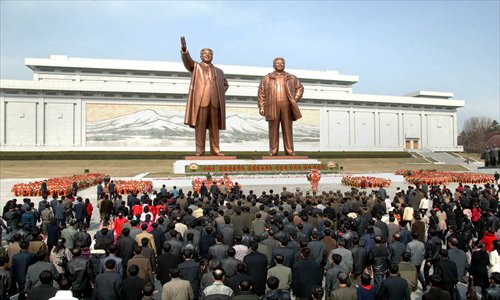Blogging@N.Korea


Some say he's the deputy editor-in-chief of a Shenzhen newspaper, some say he's a journalist with a magazine called the Voice of Pyongyang and some say he's a businessman trading goods along the border of China and North Korea.
But he says he just wants people to enjoy reading his Weibo account, which lifts the lid on China's secretive communist neighbor, North Korea.
Since July, the Weibo blogger known as "Writer Choi Seong-Ho," who claims to be from North Korea, has attracted more than 850,000 followers. Each day, he attracts tens of thousands of comments.
"I never expected that I would have this many followers," Choi told the Global Times. "I do feel some pressure from having this many people watching me."
To get in touch with Choi, the Global Times e-mailed him an interview request, but he gave a short but prompt response saying that he was afraid to say too much to a mainstream newspaper, and instead accepted an e-mailed list of questions. Choi gave his answers the next day, but avoided answering questions regarding his nationality.
In his posts, which are often about people's lives in Pyongyang or comments on international news, Choi speaks ill of "US imperialism," and praises the communist leaders of North Korea in a humorous, albeit sometimes sarcastic way.
"When you look at the countries' names, you can tell that the Democratic People's Republic of Korea has democracy and loves for its citizens," he said in one of his latest posts, "but the United States just rallies a motley crowd, and the citizens must suffer from all sorts of hardships."
Choi's willingness to talk about North Korea in a lighthearted manner is a stark contrast to the country's tight control over its citizens' freedom of speech. This has led many Weibo users to question whether he's really North Korean, despite the fact that Choi has recently posted pictures of a North Korean household registration document, and his computer screen showing a Korean language website.
The blogger, however, doesn't seem to be bothered by these suspicions.
"I'll let you judge my nationality on your own," he said. "As long as people like what I write, I'll keep writing."
Choi told the Global Times that he went to high school in Northeast China's Jilin Province, and is now involved in trade. When "on business trips," Choi said, he travels to Beijing, Dandong, Liaoning Province and Vladivostok, in Russia.
Skyrocketing popularity
Choi's followers range from Asian studies scholars to Korean folk musicians. He's also followed by high-profile Weibo celebrities, such as Kai-Fu Lee, the former head of Google China, and Zhang Lifen, the editor-in-chief of the Financial Times Chinese edition.
One of Choi's followers is Li Qihong, the head of a Beijing firm offering medical image processing and analyzing services. The company chairman told the Global Times that he was attracted by the blogger's funny jokes nine months ago, and now he has developed a real interest in North Korea thanks to Choi.
He said he believes Choi is a real North Korean, arguing that a fake one wouldn't spend that much effort relentlessly praising the country. In contrast, another of his followers, an online novel writer also surnamed Li, is firmly convinced that the blogger is Chinese. The writer, however, told the Global Times that he would continue following Choi regardless of the blogger's nationality. "His posts provide a unique insight into North Korea and reveal how people lead their lives there," Li said. "It's a good, unofficial voice that surprises me in ways that traditional media can't."
Zheng Jiyong, a scholar with the Center for Korean Studies at Fudan University, told the Global Times that Choi's popularity stems from Chinese people's curiosity toward North Korea.
"North Korea often makes international news headlines, but we only have very limited access to this mysterious neighbor due to its tightly controlled political environment and closely censored media," Zheng said. "This makes people turn to unofficial means to learn about the country, such as Choi's Weibo."
Lone voice
Choi told the Global Times that he has a group of North Korean friends whom he often interacts with.
"We talk about each other's lives, and sometimes we study the Juche idea and revolutionary theory together," he said.
However, the self-described North Korean's popularity hasn't encouraged others from the country to disclose their nationality or publicly talk about their nation. In fact, North Korean's lives in their country or in China remain a mystery.
North Korean waitresses at a Beijing restaurant were reluctant to comment on the differences between lives in China and their home country when contacted by the Global Times.
"I've gotten used to all the differences, and I enjoy living in Beijing because I can learn Chinese and China's food culture," said a Pyongyang waitress, who is on a three-year internship visa to China.
Zheng said this reluctance is normal for citizens from any countries with tightly controlled political systems. "It's like China back in the 1960s and 1970s," he said. "People are very afraid of saying the wrong thing."
Although more and more people are turning to the talkative Choi to satiate their curiosity about the country, Zheng said his posts lack the necessary depth for people to learn about the real North Korea.
"Choi simply picks news online and shapes his posts to cater to his Chinese followers," Zheng said. "It's more of a platform for entertainment than a place to learn."
Liu Chengcheng, who has studied North Korean culture as a side interest for a decade and runs the Weibo account "Exploring North Korea," told the Global Times that Choi's posts impartially display the lives of Pyongyang residents but rarely offer valuable new information. "Choi reiterates the North Korean mainstream media's exaggerated style and makes the news funny," said Liu, who has been to the country twice. "It can be considered as a source of fair information, but it doesn't add to what's already available on the websites of the nation's state-run media," he said.